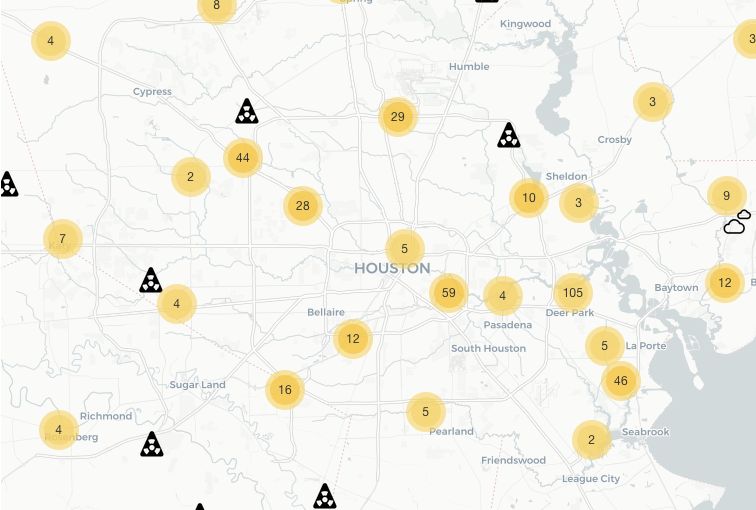Criminal justice reform. Child care. Arts resources in schools. There's a whole body of research and advocacy work around each of these topics but bringing those to bear on public policy conversations is a difficult process. One way to make the connection? Smart data visualizations that can give officials, as well as community members and advocates, new insights into systems, even those they might already work with or know.
Sometimes, that means working with the government.
The work of people like Jeff Reichman, principal for the data firm January Advisors, his team and other data-minded members of Houston's technology community, for example, was critical during Hurricane Harvey. So much so that the City took notice, partnering with folks who, amid the rainfall, had launched rescue and, later, recovery tools that helped connect people in need with those able to help.
But sometimes, that also means working in spite of the government. So while the state is required to make public certain environmental information, it can be difficult to actually access or interpret that data. "If the government isn’t making it easy for you," Reichman said Tuesday at a presentation during the Rice Data Science Conference, organized by Rice University's Ken Kennedy Institute for Information Technology, "and it's a byproduct of our work, then we’ll make it easy for the next person."
A proponent of open source data, Reichman explained how, through working with advocacy groups, January Advisors has helped harvest and visualize data as well as render it more accessible to the everyday user interested in learning more about their community, whether it's the availability of theater programs at nearby schools or information about the latest air quality permit application filed by businesses expecting to produce certain air pollutants.
"There's advocacy work based on whatever you care about," he said.
In partnership with Air Alliance Houston, January Advisors put together a dashboard to track environmental hazards across the region. "Although much of the data presented in the BREATHE tool is publicly available," the dashboard documentation notes, "the relevance of the various datasets can be difficult to conceptualize without the availability of a clear spatial reference." Indeed, users can see the location of various air monitors as well as the highest reading for each pollutant within the past 24 hours. They can see emission events, air quality permit applications, environmental complaints and more.
Beyond documenting the details of a problem many in the Houston area, particularly those living near its Ship Channel, are aware of to some degree, the tool also arms residents with relevant information for more engagement. So after an air quality permit application is filed, residents have a limited window to provide comments on the application. "Most people don’t know how to file a comment," said Reichman, and "it's not that they don’t know how to get online and fill out of a form, it's that they don’t know the right thing to say." Data visualizations like the BREATHE tool can help fill in the blanks.
Data doesn't always create the desired change or dissolve all inaction, of course. And Reichman admitted that he's built tools intended for policymakers that ultimately didn't seem to impact policy outcomes, including a map of the areas that would be off-limits under a proposed ordinance for new group housing for formerly incarcerated people. Trying to demonstrate what he felt was an unnecessarily restrictive requirement that treated all parolees the same, Reichman shared the map with city officials. The ordinance still passed.
"What I learned from that is sometimes the outcome is preordained," said Reichman.
In addition to making data from public entities more accessible, Reichman described how working with data from a range of sources, including places like Craigslist and Zillow as well as county property records went into a map of naturally occurring affordable housing in the Houston area. Created for the Houston branch of the Local Initiatives Support Corporation, the map helps identify properties at risk of becoming unaffordable in the hopes of encouraging targeted interventions. "If property tax goes up by 30 percent on a commercial property," explained Reichman, "you damn well better believe that rents are going up as well."
Building effective data tools means keeping up with public policy discussions, connecting with others in the technology community as well as stakeholders beyond it and incorporating feedback. When January Advisors launched its criminal court dashboard for the Texas Criminal Justice Coalition, the team was able to get fast, additional feedback from experts, politicians and others. "We launched it and we put it out there and we said what do people think of this," said Reichman. "You have to get input from those subject matter experts on an ongoing basis."
The key for Reichman isn't only whether a project reveals something new to him, but whether it also reveals something new to people interacting with it.

